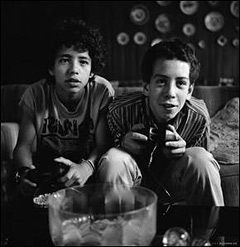 |
 |
 |
 Entertainment | July 2006 Entertainment | July 2006  
'Duck Season'
 Kenneth Turan - LATimes Kenneth Turan - LATimes


| | Diego Cataño is Moko and Daniel Miranda is Flama in director Fernando Eimbcke's "Duck Season" (aka "Temporade de Patos"), a Warner Independent Pictures release. (Jamie B. Ramos) |
Sometimes a film about nothing can be a film about everything; a film without overwhelmingly dramatic events can delight you more than an outsized epic. The sly and disarming “Duck Season” is such a film.

A major success in Mexico, where it won an unprecedented 11 Ariels, the local version of the Oscars, “Duck Season” has traveled exceptionally well. The film has screened in more than 70 festivals, been distributed in more than 30 countries, lighted up Critic's Week at Cannes, won the grand jury prize at AFI Fest and got a best foreign film nomination from the Independent Spirit awards. Better than average for an 85-minute black-and-white film about the laziest of lazy Sundays for two 14-year-old Mexico City boys.

“Duck Season” is in fact so whimsical and idiosyncratic, so reluctant to rush its narrative, that viewers will be forgiven for wondering in the early going if this unhurried, seemingly uneventful film is the same one that collected all those honors.

But writer-director Fernando Eimbcke, working on his first feature after a successful series of shorts, absolutely knows what he is doing. As the Sunday in question spirals delicately but unmistakably out of control, Eimbcke's quiet but steely assurance asserts itself and causes all the film's disparate strands to come wonderfully together.

The Sunday in question takes place in the Mexico City apartment of 14-year-old Flama (Daniel Miranda). He and best friend Moko (Diego Cataño), delighted to be left alone by Flama's mother, are preparing for an afternoon of carefully poured king-sized Cokes and Xbox video games.

So intent are they on deciding who should be Bin Laden and who Bush, the boys barely care that Flama's 16-year-old neighbor, the fetching Rita (Danny Perea), is so determined to bake a cake that she has talked Flama into letting her use the family kitchen.

Though she looks angelic, Rita turns out to be a creature without boundaries who is as interested in snooping around and sampling everything as she is in baking, someone who amusingly treats Flama's kitchen as if it were her own. Then the apartment's power goes out and the boys are so bored that, for diversion as much as food, they order a pizza from Telepizza, which guarantees 30-minute delivery.

But when Moko decides that the pizza is 11 seconds late and Flama refuses to pay, wacky deliveryman Ulises (Enrique Arreola) refuses to leave without his money, adding the fourth and final loose cannon to the apartment mix.

The things that happen among these four are in one sense too inconsequential to describe, events that sound uninvolving in words but win us over on screen. Secrets are exchanged, confidences are shared and a painting of ducks on the wing takes on almost mystical significance. Taken together, what we see bonds these people to one another, and to us, changing lives irrevocably in an unassuming if not necessarily quiet way. (We're talking teenage boys here, after all.)

“Duck Season” has a great sense of what it really feels like to be 14, a much different thing than what the movies usually insist it is. In this world of no more than the most nominal adults, this quartet turns itself into an off-the-cuff family, listening intently to one another as they work through questions of sexuality, identity, what to do about bad jobs and impending divorce. What we are watching in “Duck Season,” the source of all its success, is something very human, with all the surprise and wonder that that condition implies. | 
 | |
 |



